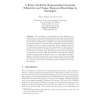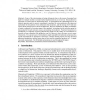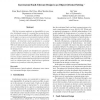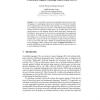378 search results - page 65 / 76 » From Natural Semantics to Abstract Machines |
COOPIS
2003
IEEE
14 years 25 days ago
2003
IEEE
Abstract. Time modeling is a crucial feature in many application domains. However, temporal information often is not crisp, but is uncertain, subjective and vague. This is particul...
IFM
1999
Springer
13 years 11 months ago
1999
Springer
: Some of the shortcomings of using refinement alone as the means of passing from high level simple models to actual detailed implementations are reviewed. Retrenchment is presente...
APAQS
2001
IEEE
13 years 11 months ago
2001
IEEE
With the increasing emphasis on dependability in complex, distributed systems, it is essential that system development can be done gradually and at different levels of detail. In ...
CNL
2009
13 years 8 months ago
2009
Abstract. As it is well-known, querying and managing structured data in natural language is a challenging task due to its ambiguity (syntactic and semantic) and its expressiveness....
JIKM
2008
13 years 7 months ago
2008
Expert systems (ESs) are complex information systems that are expensive to build and difficult to validate. Numerous knowledge representation strategies such as rules, semantic net...




